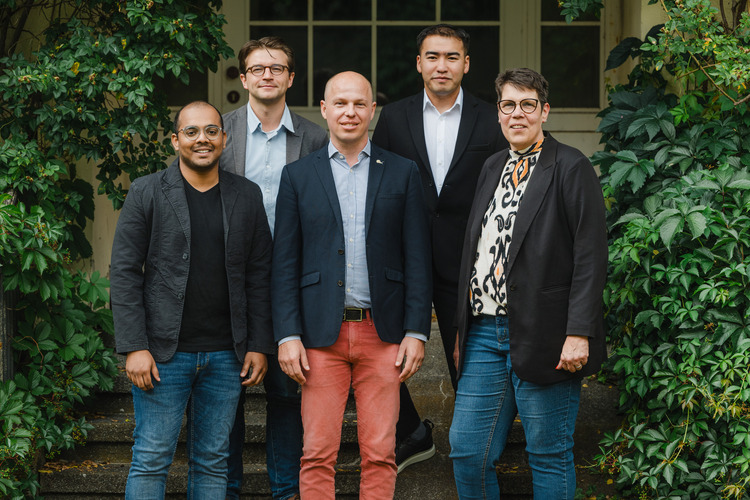Chair ofResponsible Management Chair person note
 We are living through an age of accelerating grand crises, rooted in severe social and environmental issues. Many of these issues and crises are caused by outrageously and tragically common irresponsible, unsustainable, and unethical logics of economic, business, and management practice: The growth paradigm, productivism, extractivism, managerialism, profit maximization, short termism, shareholder primacy, linear take-make-waste, instrumentalization of human beings and wider nature as mere resources to be exploited. The list is long and keeps expanding.
We are living through an age of accelerating grand crises, rooted in severe social and environmental issues. Many of these issues and crises are caused by outrageously and tragically common irresponsible, unsustainable, and unethical logics of economic, business, and management practice: The growth paradigm, productivism, extractivism, managerialism, profit maximization, short termism, shareholder primacy, linear take-make-waste, instrumentalization of human beings and wider nature as mere resources to be exploited. The list is long and keeps expanding.
The purpose of the Chair for Responsible Management is to study, develop, and promote alternatives to these problematic logics of business and management. Examples for alternative more socially and environmentally desirable logics of practice can be found, among others, in humanistic, indigenous, biomimetic, post-growth, sufficiency, circular, rewilding, and stakeholder-democratic management, and restorative management logics, as well as the practices and business models shaped by them. We conduct engaged scholarship including research, teaching, and transfer work, harnessing the explanatory power of three main lenses, responsible management, alternative business models, and performative practices. We study these topics in the context of contemporary trends and forces, such as the twin transition of digitalization and sustainability.
- Prof. Dr. Oliver Laasch
The team
Behind left to right: Neeltje Rohlfes, Farrukh Mirzaev
Teaching
We offer the following courses:
Master in
International Sustainability Management
- Energy, Business, Climate, & Geopolitics
- Principles and Practices of Responsible Business and Management
- Biomimetic management
- Postgrowth management
- Responsible Management of AI and AI in Responsible Management
Research
Research Approach
We conduct engaged qualitative and mixed methods research aiming for the highest levels of both scientific rigour and practical relevance.
Research topics
Responsible management
We study more responsible, ethical, and sustainable alternative practices, such as biomimetic or humanistic management, responsible management innovation, or how management can learn from radical climate activism.
Digitalization ethics, responsibility, and sustainability
We study the responsible, sustainable, and ethical management of digital technologies (such as AI) and how digital technologies can enable more responsible, sustainable, and ethical management practices.
Alternative business models
We study business models built around alternative, non-commercial logics, such as sustainability business models, social enterprise models, or sports business models.
Research philosophy and qualitative methods
We explore the use of alternative ontologies, of performative research that shapes social realities as opposed to just describing them, as well as advanced qualitative analysis and theorizing methods.
Academic Articles
2024
Responsible Management-as-Process of Smoothing–Striating
JOURNAL OF BUSINESS ETHICS
Books
2024
Principles of Business and Management : Practicing Ethics, Responsibility, Sustainability (3rd edition)
Sage, 968
Books
2024
Responsible Business
Taylor and Francis
Media
2024
Why Companies Should Embrace Disruptive Climate Activism
Harvard Business Review
Other Intellectual Contributions
2024
Win-Win - Disruptiven Klimaaktivismus einbinden statt ausgrenzen!
HARVARD BUSINESS MANAGER, 45, 32-36
Academic Articles
2023
Corporate Sustainability: Managing responsible business in a globalized world
ACADEMY OF MANAGEMENT LEARNING AND EDUCATION
Academic Articles
2023
The Interdisciplinary Responsible Management Competence Framework: An Integrative Review of Ethics, Responsibility, and Sustainability Competences
JOURNAL OF BUSINESS ETHICS, 187, 733–757
Academic Articles
2023
Radicalizing Managers’ Climate Education: Getting Beyond the Bull**** Fairy Tale of Eternal Economic Growth
JOURNAL OF MANAGEMENT EDUCATION, 48 (1), 110-140
Academic Articles
2023
Why be an editor?
ACADEMY OF MANAGEMENT LEARNING AND EDUCATION, 22(4), 569-573
Academic Articles
2023
The Organizational Dynamics of Business Models for Sustainability: Discursive and Cognitive Pathways for Change
ORGANIZATION AND ENVIRONMENT, 36 (2), 211-227
Team and contact
Prof. Dr. Oliver Laasch
Academic Director, Master in International Sustainability Management


